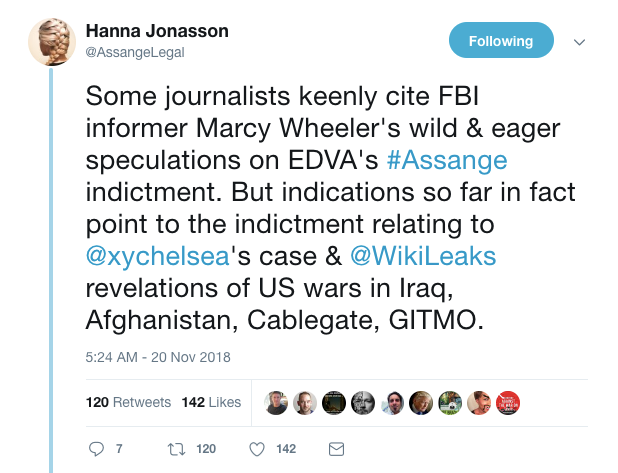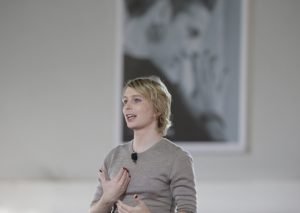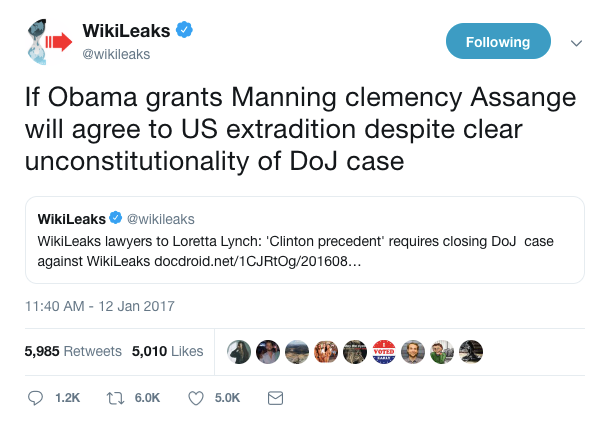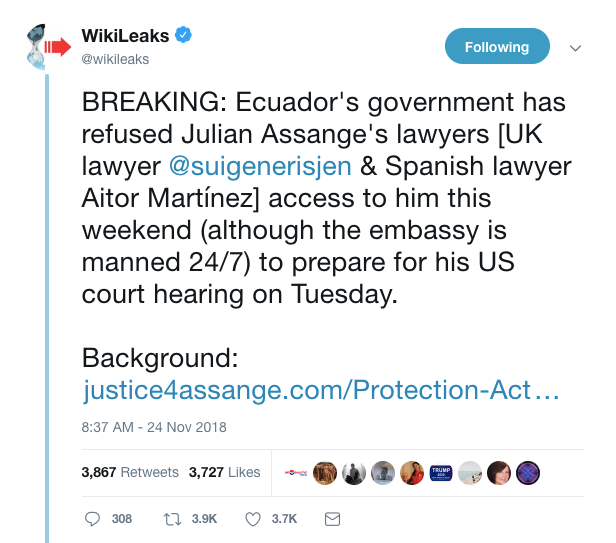Assange Prosecution Will Focus On Chelsea Manning Era Releases, Not DNC Emails

This article is my own intellectual property, and was originally published via Disobedient Media.
It seems that the shades have finally been ripped off of the persecution of Julian Assange. Fallen by the wayside is the pretense used to justify his arbitrary detention: allegations of sexual misconduct, of Russian involvement, and of aiding Trump's ascension to the Presidency.
Gone is the pretense that it is not the rabid wolves of the US and UK military state baying, slavering for Assange's blood. Former intelligence assets in the guise of "journalists" openly call for Assange's arrest.
Recent reports have indicated that formerly secret charges pending against Julian Assange will focus on material relating to Chelsea Manning and the earliest releases published by WikiLeaks. Alternatively, on WikiLeaks' Vault7 releases in March 2017 or on the help he and his organisation gave to Edward Snowden to get the NSA whistleblower to safe asylum.
This latest news directly counters allegations published by Russiagate hysterics, who suggested the charges would relate to WikiLeaks' 2016 publications of the DNC and John Podesta emails. Nonetheless, we can assume that in the coming days and months, establishment hacks will pivot and attack Assange just as loudly and abhorrently as they always have. Few of them will bother to remind their readers that the campaign emails of a political party are not US Government documents, are not classified Secret or Top Secret, and are therefore not going to be the subject of a federal prosecution in the Alexandria Division of the Eastern District of Virginia (EDVA), where the jury pool is selected from a population with the highest concentration of US intelligence and defence industry employees in the United States.
The distinction between the possible prosecution of the WikiLeaks co-founder for his 2016 publications versus the earliest WikiLeaks releases is a massively important one. For Russiagate proponents, the support for Assange's prosecution becomes much more difficult if the charges against the publisher stem from the revelation of Bush-era war crimes, not the exposure of Hillary Clinton and the DNC's corruption.
As noted by numerous press outlets and press freedom advocates, the prosecution - the end point of the longstanding persecution of Julian Assange - represents, as James Goodale, New York Times' counsel for the Pentagon Papers, eloquently points out, a grave threat to the freedom of the press, in the United States and all over the world. That US espionage laws would be used against an Australian citizen who has never lived or published in the US, should send a shockwave to every international journalist who comments on US affairs and foreign policy decisions.
In Rolling Stone, Matt Taibbi relayed the statements of Assange's US-based lawyer, Barry Pollack:
“I would think it is not related to the 2016 election since that would seem to fall within the purview of the Office of Special Counsel.”
Another member of Julian Assange's legal team, Hanna Jonasson, was also quick to clarify confusion on which material served as the basis for the charges against Assange in an informative Twitter thread:

Jonasson directly refutes what she referred to as the 'wildly speculative' suggestion of security journalist and FBI informant Marcy Wheeler, who claimed that the charges against the former WikiLeaks Editor-In-Chief related to the Russiagate scandal.
Jonasson related that the document revealing the charges indicated that the indictment is in the Eastern District of Virginia. She wrote: "This is where the WikiLeaks Grand Jury (Ref:10GJ3793) has been empanelled since 2010 in order to indict Assange over the publications that Chelsea Manning was convicted over."
Jonasson continued: "The [WikiLeaks] Grand Jury was headed at the time by Neil MacBride (who was also responsible for the prosecution of CIA whistleblower John Kiriakou). MacBride is an aggressive proponent of the extraterritorial application of US criminal jurisdiction... Working under MacBride was Zachary Terwilliger, at the time MacBride was leading the WikiLeaks Grand Jury relating to [Chelsea Manning's] case. Terwilliger's signature is on the court document that revealed the sealed indictment against Assange on Thursday."
In the first live-streamed event following the gagging of Julian Assange in March, John Kiriakou relayed that the Eastern District of Virginia is known as “the Espionage court,” as no national security defendant had ever won a case there, and it is the home of the Central Intelligence Agency. He said: “Assange couldn’t possibly get a fair trial in the Eastern District of Virginia.”
Jonasson also related that a 2011 Stratfor email published by WikiLeaks in 2012 suggested the existence of a sealed indictment against Assange. She added that: "Mueller's grand jury is impanelled in Washington DC, not EDVA. Some reports oddly assume that the indictment has to do with Mueller's probe, rather than a grand jury impanelled in EDVA."

Above: Chelsea Manning addresses an audience in Nantucket, Mass. on Sept. 17, 2017. Image: Associated Press.
As intimated by Jonasson, the existence of such charges against Assange is hardly a new revelation. In an article published with Common Dreams, Nozomi Hayase wrote: "On November 29, 2010, the US Attorney General publicly confirmed the existence of a secret grand jury investigation into disclosures of classified information made by WikiLeaks."
Hayase continued, eloquently conveying the importance of WikiLeaks and the whistleblowers it protects, calling alleged sources like Chelsea Manning the 'conscience of America':
"In this war of a tyrannical state on the First Amendment, Assange became a lightning rod to take all the heat, so ordinary people can uphold these ideals that are inscribed in their hearts, defending them against all enemies, foreign and domestic... As the invisible beast inside the US government devours the hearts of these brave young patriots, WikiLeaks acted as a shield. This was demonstrated in their extraordinary source protection."

As discussed in Suzie Dawson's Being Julian Assange, edited by this writer, Julian Assange and WikiLeaks's central role in raising support for Chelsea Manning has been virtually memory-holed by establishment media. While the legacy press is happy to interview Manning on her choice in lipstick color, it is loath to recall that it was Julian Assange who, in January 2017, promised his own extradition on the condition that Manning was to be given clemency. Four months later, thanks in part thanks to Assange's promise, Chelsea Manning was freed.
The recent confirmation of charges against Assange led to a number of organizations reiterating their support for him, including the ACLU, Human Rights Watch, and the Committee to Protect Journalists.
The recent confirmation of the US's intent to extradite and prosecute Assange also confirms what his supporters have stated for years: Assange is a political prisoner. His asylum in the Ecuadorian embassy in London has been transformed under the government of President Lenin Moreno into a torture chamber, that Pulitzer-prize-winning journalist Chris Hedges recently characterized as a "little house of horrors."
In the title of his piece, Hedges compares Assange's treatment to the Crucifixion of Christ. Like Nozomi Hayase's description of WikiLeaks acting as a shield for whistleblowers, Hedges's allegorical comparison of Assange's treatment with crucifixion gets at the heart of not only the journalist's shocking suffering on behalf of others and evident selflessness, but also the degree to which the slow death of Assange is taking place in public, mocked by crowds of what should be his strongest protectors: fellow journalists.
In a discussion with fellow journalist and Editor-In-Chief of Consortium News Joe Lauria, it was alleged that Assange went multiple days without food after his lawyers were forbidden from visiting him. Chillingly, it appears that Assange has been barred from meeting with his legal counsel again over the weekend, preventing him from preparing for an upcoming US Court hearing:

As Hedges discussed with Lauria, and as intimated by Christine Assange in an audio clip played during the RT segment, it appears that the Ecuadorian government is essentially smoking Assange out of the embassy by making his protracted confinement there unlivable.
Meanwhile, the Committee to Protect Journalists stated: "We are closely monitoring reports that prosecutors have prepared a sealed indictment against Julian Assange... While the charges are not known, we would be concerned by a prosecution that construes publishing government documents as a crime. This would set a dangerous precedent that could harm all journalists, whether inside or outside the United States."
With the establishment backed into a corner, forced to prosecute Assange not only in a legal setting, but in the court of public opinion, for WikiLeaks's earliest releases, we can expect to see an attempt to reignite smears portraying Assange and WikiLeaks as having recklessly published unredacted material during Cablegate. This claim was refuted during Chelsea Manning's trial by General Robert Carr, head of the Pentagon Task Force investigating any potential harms from the publication, who stated, under oath, that they had been unable to find a single person who had been physically harmed by WikiLeaks' war leaks and Cablegate. Most of the public remains, however, ill-informed on the rigorous process with which WikiLeaks both validates and carefully redacts its publications.
During Cablegate, this effort was foiled by the reckless decision of a journalist with the Guardian newspaper. Press reports at the time relayed WikiLeaks's official statement on the publication of unredacted copies of US State Department cables:
"A Guardian journalist has, in a previously undetected act of gross negligence or malice, and in violation of a signed security agreement with the Guardian's Editor-in-Chief Alan Rusbridger, disclosed top secret decryption passwords to the entire, unredacted, WikiLeaks Cablegate archive... We have already spoken to the (US) State Department and commenced pre-litigation action."
In Laura Poitras's controversial documentary Risk, one crucial scene depicts WikiLeaks' attempt to contact the US State Department, then under Hillary Clinton as Secretary of State, in order to warn them that thousands of US diplomatic cables had been leaked, unredacted, due to the incompetence of David Leigh.
The Daily Dot recalled Julian Assange's account of the fiasco:
"... In an act of gross negligence the Guardian newspaper—our former partner—had published the confidential decryption password to all 251,000 cables in a chapter heading in its book, rushed out hastily in February 2011... At the rate the information was spreading, we estimated that within two weeks most intelligence agencies, contractors, and middlemen would have all the cables, but the public would not."
I decided it was necessary to bring forward our publication schedule by four months and contact the State Department to get it on record that we had given them advance warning. The situation would then be harder to spin into another legal or political assault. Unable to raise Louis Susman, then US ambassador to the UK, we tried the front door.
WikiLeaks investigations editor Sarah Harrison called the State Department front desk and informed the operator that “Julian Assange” wanted to have a conversation with Hillary Clinton. Predictably, this statement was initially greeted with bureaucratic disbelief. We soon found ourselves in a reenactment of that scene in Dr. Strangelove, where Peter Sellers cold-calls the White House to warn of an impending nuclear war and is immediately put on hold. As in the film, we climbed the hierarchy, speaking to incrementally more superior officials until we reached Clinton’s senior legal advisor. He told us he would call us back. We hung up, and waited."
As reported by The Atlantic, WikiLeaks threatened to sue the Guardian over the publication of the encryption password by David Leigh.
Over the years that Assange has been illegally trapped in the Ecuadorian embassy, his selflessness has been mislabelled arrogance, and a lack of concern for himself has been branded callousness. Adding insult to injury, the very same hack journalists responsible for the unredacted leak of the State Department cables branded Assange unfeeling.
An article published by New Matilda in 2015 illustrated the betrayal by the Guardian in this oft-overlooked history of Cablegate's rocky release. The same individuals who exposed vulnerable sources in publishing the encryption password ironically labelled Assange callous and arrogant:
"People have made money, often big money, while WikiLeaks has struggled to survive...With not a penny going to Assange or to WikiLeaks, a hyped Guardian book led to a lucrative Hollywood movie. The book's authors, Luke Harding and David Leigh, gratuitously described Assange as a "damaged personality" and "callous". They also revealed the secret password he had given the paper in confidence, which was designed to protect a digital file containing the US embassy cables."
Returning to the present, it seems necessary to get some obvious points out of the way: the revelation of longstanding charges against Assange sweeps away the paltry establishment narrative that has portrayed him as hiding within the broom closet of the Ecuadorian Embassy for fear of allegations of sexual assault. It also negates the line copy-pasted by endless trolls: "He can leave whenever he likes." We now can state unequivocally that Assange is being tortured by the Ecuadorian government, while under siege by the US and UK military establishment, for the "crime" of searingly accurate journalism.
In essence, the unelected power structure of the US and UK has consistently and specifically projected its psychopathic nature onto Assange and WikiLeaks. Indeed, the unparalleled lengths WikiLeaks has gone to in order to protect its alleged sources - and even non-sources, like Edward Snowden - can be directly contrasted with journalists like Marcy Wheeler who voluntarily turned her unnamed source in to the FBI. The hatred with which Marcy and her cohorts appraise Assange might, in this light, appear rather natural.
Curated for #informationwar (by @commonlaw)
Our purpose is to encourage posts discussing Information War, Propaganda, Disinformation and other false narratives. We currently have over 8,000 Steem Power and 20+ people following the curation trail to support our mission.
Join our discord and chat with 200+ fellow Informationwar Activists.
Join our brand new reddit! and start sharing your Steemit posts directly to The_IW!
Connect with fellow Informationwar writers in our Roll Call! InformationWar - Contributing Writers/Supporters: Roll Call Pt 11
Ways you can help the @informationwar
Thank you!